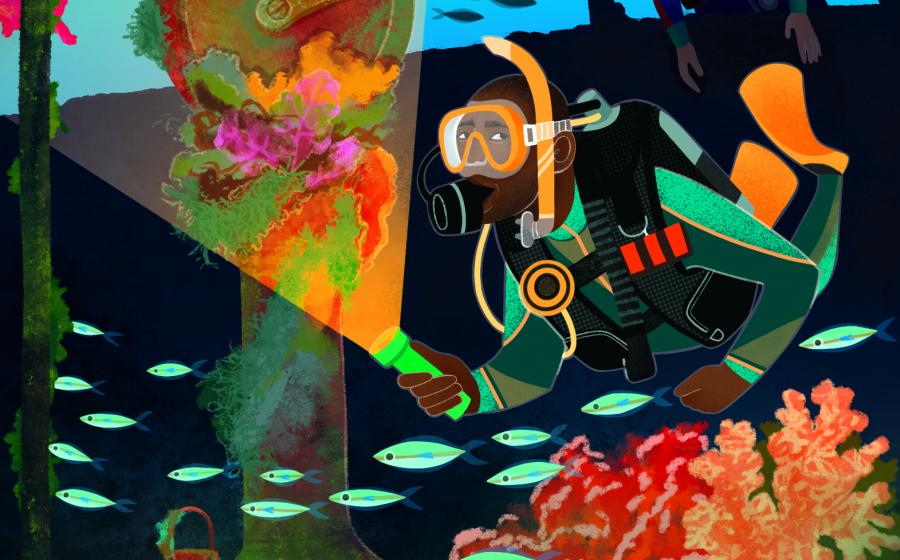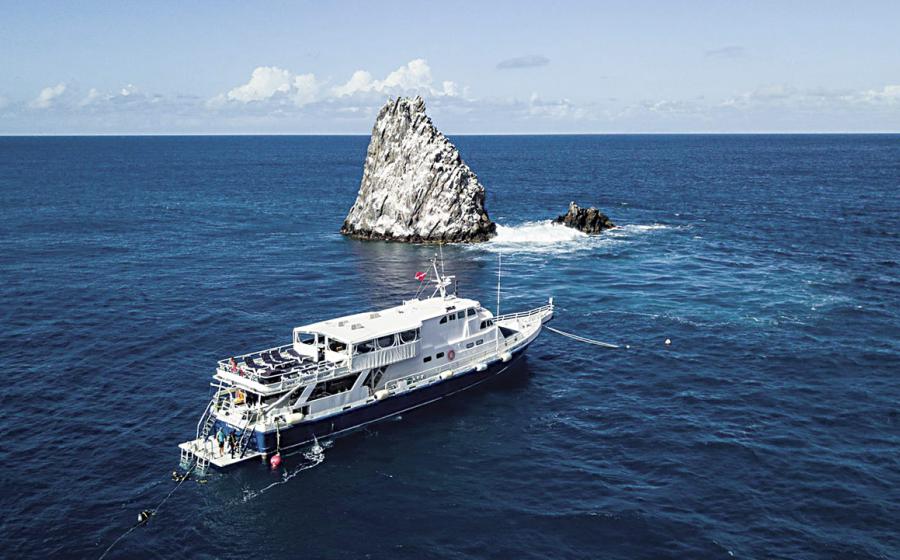In the Field: What It's Like to Be a Commercial Urchin Diver

ERIN FEINBLATTA surface-supplied hookah system extends Mutz’s bottom time.
Stephanie Mutz spent much of her youth freediving in the Southern California kelp forests near her home in Newport Beach. “I’ve always felt like I function better underwater than I do on land,” she says. “The ocean is where I feel comfortable. I knew I could never handle a job where I had to sit at a desk.”
So, it’s not surprising that today, Mutz is the only female commercial sea urchin diver operating in California. Mutz is based in Santa Barbara but dives in the Channel Islands, which are a major global hub for the supply of uni, the Japanese name for the golden-yellow lobes of urchin gonads. Uni is considered a delicacy in sushi restaurants and raw bars for its sweet and creamy yet briny flavor.
“I went to college planning to be a research diver for fisheries policy work, and a college professor,” Mutz says. She graduated with a master’s degree in marine ecology. “During the Great Recession, around 2009, I was temporarily laid off from my teaching job, so I went from part-time to full-time deckhand on an urchin boat.”
Related Reading: Divers Cull the Tide of Urchins to Help Save Kelp
Eventually, she earned a rare urchin diving permit through the state’s lottery system, which allowed her to establish her own boat and markets. “I did get my teaching job back, but I kept getting better at fishing and marketing,” she says. “I just realized I liked fishing a lot better—I was literally and figuratively hooked.”
One key to Mutz’s success has been how she sells her catch. Most urchin divers in California offload their boats straight onto a processor’s truck, which takes the urchins to have the uni removed and preserved in alum for export. Mutz, on the other hand, has developed direct relationships with high-end chefs, restaurants, seafood markets and individual consumers willing to pay a premium for fresh, unprocessed live urchins.
“My marine biology background instilled a desire to find a way to make more money from less catch,” she says. “I established this boutique market for myself where I can provide the highest quality urchins and know my resource is being appreciated and not wasted.”
Mutz says her average day starts with a two-hour commute to the Channel Islands. “I’ll spend three to five hours underwater filling bags at depths between 20 and 40 feet,” she says. “I use a surface-supplied hookah system, which gives me unlimited air and saves me from getting in and out and going up and down so much.”
Back at the dock, she either moves the urchins into live tanks or onto delivery trucks headed straight to customers mostly in Southern California, but also in Northern California, Oregon, Colorado and occasionally New York.
Currents, rough seas and big sharks are among the most common challenges she faces in the water. “I am more afraid of the current than I am of sharks,” she says. “I’ve had the occasional fly-by from a white shark, but I’m in their home, so I just move locations.”
Related Reading: Cabo’s Other Wild Side: Swimming with Blue and Mako Sharks
Once or twice a year, she also spots elusive seven-gill sharks. “They’re not really dangerous, but they look like small white sharks,” she says. “They just bump me and keep going, and it scares the crap out of me every time.”
Mutz says getting into the urchin-diving business is more about persistence and hard work than any class you can take at a college or dive shop. “You can only harvest and sell urchins in California if you have a permit, and only about 100 out of 250 are currently being used,” she says. “Anyone who wants to do this as a career must start as a deckhand on an urchin boat, work their way up, and hope to get a permit through the lottery.”
Job Requirements
Experience: Three years as a deckhand on an urchin boat required to enter permit lottery.
Salary: Varies widely based on market and fishery conditions.
Certifications: No formal certifications required.










